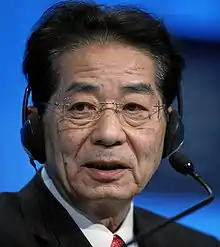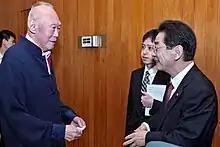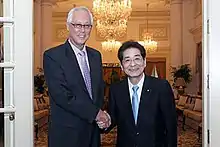Yoshito Sengoku
Yoshito Sengoku (仙谷 由人, Sengoku Yoshito, born January 15, 1946 – October 11, 2018) was a Japanese politician serving in the House of Representatives in the Diet (national legislature) as a member of the Democratic Party of Japan.
Yoshito Sengoku | |
|---|---|
仙谷 由人 | |
 Sengoku at the 2010 World Economic Forum | |
| Minister of Justice | |
| In office 22 November 2010 – 14 January 2011 | |
| Prime Minister | Naoto Kan |
| Preceded by | Minoru Yanagida |
| Succeeded by | Satsuki Eda |
| Minister of State for the Abduction Issue | |
| In office 22 November 2010 – 14 January 2011 | |
| Prime Minister | Naoto Kan |
| Preceded by | Minoru Yanagida |
| Succeeded by | Kansei Nakano |
| Chief Cabinet Secretary | |
| In office 8 June 2010 – 14 January 2011 | |
| Prime Minister | Naoto Kan |
| Preceded by | Hirofumi Hirano |
| Succeeded by | Yukio Edano |
| Minister of State for National Strategy | |
| In office 7 January 2010 – 8 June 2010 | |
| Prime Minister | Yukio Hatoyama |
| Preceded by | Naoto Kan |
| Succeeded by | Satoshi Arai |
| Minister of State for Civil Service Reform | |
| In office 16 September 2009 – 8 June 2010 | |
| Prime Minister | Yukio Hatoyama |
| Preceded by | Position established |
| Succeeded by | Kōichirō Genba |
| Minister of State for Government Revitalisation | |
| In office 16 September 2009 – 10 February 2010 | |
| Prime Minister | Yukio Hatoyama |
| Preceded by | Position established |
| Succeeded by | Yukio Edano |
| Member of the Japanese House of Representatives for Tokushima's 1st district | |
| Assumed office 18 February 1990 | |
| Preceded by | Constituency established |
| Personal details | |
| Born | 15 January 1946 Tokushima, Japan |
| Died | 11 October 2018 (aged 72) Tokyo, Japan |
| Political party | Democratic Party (1996–present) |
| Other political affiliations | Social Democratic Party (Before 1996) |
| Alma mater | University of Tokyo (Incomplete) |
| Website | Official website |
Overviews


He was born in Tokushima, Tokushima prefecture. While studying in the University of Tokyo, he passed the bar exam and therefore dropped out of the university. He was elected for the first time in 1990 as a member of the Japan Socialist Party.
Viewed as a close ally of Prime Minister Naoto Kan, the opposition Liberal Democratic Party has labeled Sengoku as the "second" Prime Minister of the Kan cabinet. Sengoku denies that he wields any extraordinary influence in the government and praised Kan as a "strong leader".[1]
In January 2011, he was ousted from his position as a top cabinet member due to swelling pressure from the opposition, namely the Liberal Democratic Party and Komeito Party, to execute cabinet reform. Sengoku was replaced by Yukio Edano, who was expected to yield much influence over Kan as a protégé of Sengoku.
In March 2011, Prime Minister Naoto Kan appointed Sengoku as Deputy Chief Cabinet Secretary.[2]
He lost his seat in the December 16, 2012 general election.[3]
References
- "Sengoku's growing influence causes a stir". The Japan Times. 2010-10-23. Retrieved 2010-10-23.
- "Kan brings Sengoku back into gov't to deal with nuke crisis". Kyodo News English. March 17, 2011. Archived from the original on March 20, 2011. Retrieved March 17, 2011.
- Japan Times Nothing left for the election-gutted DPJ to do but rebuild December 18, 2012
External links
- Official website (in Japanese)
| House of Representatives of Japan | ||
|---|---|---|
| Preceded by Masaharu Gotōda Takeo Miki Kazuyoshi Endō Motoharu Morishita Hironori Inoue |
Representative for Tokushima's At-large district (multi-member) 1990–1993 Served alongside: Masaharu Gotōda, Shunichi Yamaguchi, Kazuyoshi Endō, Hironori Inoue |
Succeeded by Masaharu Gotōda Shunichi Yamaguchi Kazuyoshi Endō Yoshihito Iwasa Akira Shichijō |
| New constituency | Representative for Tokushima's 1st district 1996–present |
Incumbent |
| Party political offices | ||
| Preceded by Yukio Edano |
Chairperson of the Policy Affairs Research Council of the Democratic Party 2004–2005 |
Succeeded by Takeaki Matsumoto |
| Political offices | ||
| New office | Minister of State for Civil Service Reform 2009–2010 |
Succeeded by Kōichirō Genba |
| Minister of State for Government Revitalization 2009–2010 |
Succeeded by Yukio Edano | |
| Preceded by Naoto Kan |
Minister of State for National Strategy 2010 |
Succeeded by Satoshi Arai |
| Preceded by Hirofumi Hirano |
Chief Cabinet Secretary 2010–2011 |
Succeeded by Yukio Edano |
| Preceded by Minoru Yanagida |
Minister of Justice 2010–2011 |
Succeeded by Satsuki Eda |
| Minister of State for the Abduction Issue 2010–2011 |
Succeeded by Kansei Nakano | |